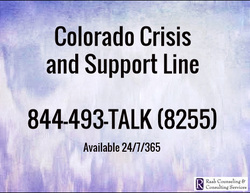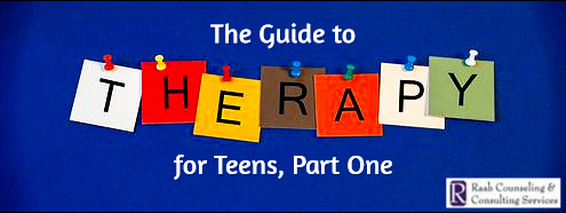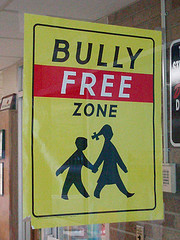|
Why is my Mom is Making Me Go to Therapy? If you are reading his post, you are probably one of two types of people:
My next few posts are all about helping parents and teens understand each other’s point of view about going to counseling. Today, I answer two very common questions from teens about therapy. “Can my parents make me go to counseling?” The answer is a little tricky. Legally, it varies from state to state. In Colorado, teens who are 15 years and older MUST consent to their own therapy. Parents have to give their permission for teens who are under the age of 15 to be seen by a counselor. The age limit might be different in your state, but written permission for therapy is required everywhere. So, if you are under 15, and live in Colorado, your parents can “make” you go to therapy. They can also strongly encourage older teens to go or make it a requirement in their home. What parents cannot do, is force you to talk or make you be honest with your therapist. This is something you have to decide for yourself, regardless of your age. “Why do my parents think I need to go to therapy?” Sometimes it can help to speak with someone who is objective, meaning they aren't part of your family, your school or your community. Some of the main reasons I see teens for counseling are when they experience:
This is just a short list of the things you can talk about in therapy sessions. Nothing is off limits. If you want to talk about it, go for it! Therapists are great listeners PLUS they'll offer suggestions and work with you to meet your goals. Check back next week for a post about what you can expect when you go to therapy sessions. I'll also be posting soon about what's up with your therapist and why you just might like therapy! Update: Check out the second and third parts of the series! The Guide to Therapy for Teens, Part Two: What to Expect in Counseling The Guide to Therapy for Teens, Part Three: What's the Deal with Your Therapist? Bethany Raab is a Licensed Clinical Social Worker in Denver, Colorado.
She is passionate about helping teens and families be happy and healthy!
Sometimes, being true to yourself means doing the opposite of what others are doing. This can be really hard to do when classmates and friends are pushing your teen to do something. The teen years are full of finding oneself, while also wanting to fit in with peers. What a complicated time! Here are some ways parents (and other adults) can help teens express their individuality! Allow them to make choices. Even though elementary, middle and high school students are not ready to make many big choices on their own, it is good for them to have some opportunity to choose. Clothes, leisure activities and how they spend their money are some great places to start. Teach your teen that all actions have consequences. Some choices have consequences your teen will not foresee. Other times, they will act despite knowing the consequences. Use these times as teaching moments to help your teen improve their decision making skills. Do not embarrass them on purpose. Publicly criticizing your teen’s decisions is unlikely to be helpful in the long run. If your teen has made a choice that is not acceptable, do your best to address this away from the public eye. Not only will this allow for real conversation about the issue, it will also help your teen feel as though you are on their side, even if you do not always agree. Support them. Sometimes teens will make decisions that make little or no sense to the adults in their life. It is not your job to steer your child away from unpleasant experiences, but to be their cheerleader and help them learn. If your child decides to wear all black for months on end, find out why it appeals to him or her rather than forbidding the choice. If your awkward or uncoordinated teen is certain he wants to try out for the basketball team, encourage him to give his best effort and help him prepare. Not only will your teen feel supported in their decisions, they may just surprise you and themselves in the process! That’s enough from me for now. See how you can help your teen express their individual greatness today! And get a good “opposite day” joke in if you can! :) Bethany Raab is a Licensed Clinical Social Worker in Denver, Colorado.
She is passionate about helping teens and families be happy and healthy! January 11, 2015 is National Human Trafficking Awareness Day in the United States. To be honest, I didn’t think much about the issue of human trafficking until the last couple of years. Sure, I knew it existed. I assumed that it was a problem in foreign countries, not here in the United States. Boy, was I wrong. Human trafficking is a $5-7 billion industry in the U.S. alone. It impacts 21 million victims worldwide, 1.5 million of which are Americans. (UNICEF) Just so we’re all on the same page, here is the formal definition of Human Trafficking from the Trafficking Victims Protection Act of 2000:
Basically, “Human trafficking is a form of modern-day slavery.” (Trafficking Resource Center) Scary, huh?
It is important for parents and community members to be aware of risk factors that make teenagers vulnerable to traffickers. Here are a few signs that your teen could be at risk: Teens living on the streets are prime targets for human traffickers. They tend to have a limited support system and they often hang out in high risk areas such as bus or train stations, parks and shelters. Family discord. Teens from chaotic households often seek support in inappropriate places. Older friends or strangers who give gifts or make extraordinary promises. Does your teen have older friends that you don’t know? Have they received unexpected or extravagant gifts from someone? This deserves your attention. Youth with a history of abuse or neglect may be more vulnerable to traffickers. So what can you do? Talk to your children. Connect with them. Spend time with them. Know who their friends are and where they hang out. Be engaged with your children! Seek Help. If your teen has been a victim of some sort of trauma, consider seeking help for them in the form of counseling or a support group. Their pediatrician is a great place to start in order to get connected with the right services. Reduce Conflict. If your family is riddled with conflict, take steps to work on the problem. Identify causes and implement solutions. Counseling can be helpful with this process. Contact the National Human Trafficking Resource Center. Call 1-888-373-7888 or text INFO or HELP to BeFree (233733). They are available to help victims, families and community members at any time. Let's work together to protect our communities and end human trafficking! Bethany Raab is a Licensed Clinical Social Worker in Denver, Colorado.
She is passionate about helping teens and families be happy and healthy!  844-493-TALK (8255) 844-493-TALK (8255) On August 12, 2014, the Colorado Crisis and Support Line opened its doors. This new statewide crisis hotline is open to anyone in Colorado who needs emergency mental health assistance or is seeking extra support. All callers can expect to speak to a trained mental health professional. Phones are answered 24 hours a day, 365 days a year. The crisis line phone number is 844-493-TALK (8255) You do not need to live in Denver to use the hotline! It is available to EVERYONE in Colorado! The crisis line advocates can assist callers with a variety of personal and mental health emergencies. Here are a few reasons you might call the hotline:
Please, if you need immediate assistance with a life-or-death situation, call 911 or go to your nearest emergency room. The hotline is run by the Colorado Department of Human Services (CDHS) and Metro Crisis Services. Click here to read the CDHS press release on the opening of the crisis line. Bethany Raab is a Licensed Clinical Social Worker in Denver, Colorado.
 Did you know that 1 in 4 American adults experiences mental illness every year? Or that 20% of children ages 13 to 18 experience mental health problems in any given year? (National Alliance on Mental Illness) May has been designated “Mental Health Awareness Month” in order to bring awareness to mental illness in America. In my years as a social worker, I have heard many people speak about mental illness as something to be kept secret. Some people are ashamed that they are not well and hesitate to seek help as a result. In honor of Mental Health Awareness Month, I will be discussing 5 myths about mental illness and seeking mental health care. I will also include a bonus post about self-care. This is the first of a 4 part series to be posted throughout the remainder of May. My goal is to help you better understand mental illness and mental health treatment, as well as to offer some ideas on how to get help if necessary. Please share with anyone who might benefit from this information! Here are the topics I will cover over the next 10 days:
Let's get started. Myth #1: Mental illness means I am crazy and will always be crazy. Not so. Crazy is a word often applied with little concern or compassion for those experiencing mental illness. I do not believe having any sort of mental illness makes you "crazy." I believe it means you are facing a challenge that can be managed and often overcome with time, patience, hard work, support and professional help. My challenge to all of my readers is to watch your language. No, I'm not talking about swearing or anything along those lines. What I am asking is that you observe how often you use the word "crazy" to describe someone. Unfortunately, it has become socially acceptable to label someone behaving in an odd or out of control manner as being "crazy" rather than acknowledging they may be dealing with mental illness. Let's change this bad habit and practice acceptance instead. Learn more by reading the rest of the series! Mental Health Awareness Month: Myths and Facts, Part 2 Mental Health Awareness Month: Myths and Facts, Part 3 Mental Health Awareness Month: Bonus Post! Bethany Raab is a Licensed Clinical Social Worker in Denver, Colorado.
Welcome to the latest follow up article to my Important New Year's Resolutions for Parents of Teens blog! Here you will find information on the benefits of getting teens involved in their community and ideas about how to get your family started!  Teens who are involved in community activities experience many benefits! Here are just a few: Investment in their community. Teens are able to use their time and talents to engage with others. They may also gain a better understanding of people who are different from them. Role models. Coaches, volunteer supervisors and mentors can provide a safe, positive example to teens. Self confidence. Teens' confidence in themselves will soar as they learn new skills, improve their ability to solve problems and develop leadership skills. Additionally, seeing that they make a difference can be deeply gratifying. Good work ethic. The University of Nevada Extension Office states, "young people involved in community service are more likely to have a strong work ethic as an adult." They learn how to be accountable, make and keep commitments and work well with others. Some pointers as you begin this journey: Find out what activities interest your child. Talk to them and allow them to drive the decision-making process. The more empowered your teen feels from the beginning, the more invested they will be in the -chosen activity later! For indecisive teens, parents may need to be more involved in the decision-making and planning process. Consider your teen. Take their personality into consideration. Not every child will be comfortable playing sports or stepping right into a leadership role. Help them find something that will build upon their strengths. Help them get started. Some teens may be more comfortable starting an activity with the presence of their family. Allowing them to invite a friend along may also boost their confidence heading into a new experience! Consider and manage the risks. Do your research on the organization and meet the adults who will be supervising, leading or coaching your child. Also, talk with your child about their experience on a regular basis to ensure they are safe and comfortable in their chosen activity. Finally, here are a few options to consider with your teen: Sports teams and lessons. Check out your teen's school, the YMCA or local recreation centers. Academic clubs. Mentoring programs. Hobby-based groups. Think chess club, music and theater. Community organizations like 4-H, Girl Scouts and Boy Scouts. Church youth groups. Volunteer opportunities. Hospitals, food banks and animal shelters are often looking for volunteer help. Picture from Flickr. Some rights reserved by Rob Gallop. Bethany Raab is a Licensed Clinical Social Worker in Denver, Colorado.
If, as you read, you begin to think that your family might benefit from making changes in one or more of these areas, do not worry! It is never too late to take action. See each step below for specific examples on how to bully-proof your child!
Finally, check out my 2012 blog article on helping kids know what to do if they are bullied or witness someone else being bullied. Click here to read more. Image from Flickr. Some rights reserved by Eddie~S. Bethany Raab is a Licensed Clinical Social Worker in Denver, Colorado.
Ahh, summer. The season kids yearn for and the season parents often dread. Have you ever found yourself wondering "how can I keep my teen busy over the summer?" or "how do I make sure my teenager stays out of trouble?" Below are 5 suggestions to help your teen have a fun and safe summer vacation!
1) Allow time with friends Spending time with friends is likely at the top of your teen’s list of favorite things to do. Allowing your child to spend time with friends is important. Also important is getting to know your teen’s friends and their parents. Have your child invite their friends over to the house. Drive or accompany the teens to an event. Both are ways for parents to get to know their child’s friends. Finally, enforcing rules around acceptable activities and curfew will help your teen spend safe and enjoyable time with their friends. 2) Stick to a schedule Most people love sleeping in, and no one loves it more than the teens in your life! There is something wondrous about crawling into bed, not setting the alarm, and waking up when your body is ready. However, imagine how difficult going back to school in the fall will be if your teen spends the summer staying up late and not rising until mid-to late morning? The National Sleep Foundation states that the average teenager requires 9 ¼ hours of sleep to function at their best. While school performance is certainly a part of a teen’s healthy functioning, it is not the whole story. Getting enough rest is integral to your teen’s ability to maintain a healthy attitude (mood) and body. See the full NSF article here. Help your teenager feel their best by setting a summer schedule at home that allows time for work, time for fun and time to get enough sleep! You'll be thankful you did when the first day of school arrives! 3) Follow the rules Teenagers thrive when they have a structured schedule to follow. Why? Experiencing structure and rules at home are how children and teens learn to follow society’s laws and the rules/expectations they will be subject to in school, jobs, and so forth. Just because it is summer and your teen does not have to be up early for school does not mean they automatically get to stay out late, skip chores and do what they want. Parents should enforce the house rules, give consequences when necessary and reward good behavior. Consequences should be reasonable and enforceable. Rewards should also be practical and feasible for the family. Rewards do not need to be monetary but can include extra free time doing an activity of choice or a special activity with the family or friends. Additionally, genuinely praising your teenager is a very powerful reward that can help strengthen your relationship with them and develop positive self-esteem. Check out this article from WebMD for more information on praising children of any age! Here is another resource for praising older children and teens. 4) Keep their brain and body busy Many teens may not want to be involved in a structured summer activity. However, this does not mean they should simply spend their summer sleeping, eating and playing video games! There are many ways to keep your teen active both in the home and in the community. The website Parenting a Teenager suggests that parents encourage teens to find a summer job, volunteer and stay active. Teens can also help with projects assigned by parents, other family members or neighbors. Doing yard or housework can help teens stay active. It also helps keep their parents happy! Joining a sports league, recreation center or YMCA are other ways for teens to stay active and healthy! Reading, going to the library, visiting a museum or joining a club can help your teen keep their brain active while they are out of school. 5) Spend time with them Spending time with their family is not a preferred activity for most teenagers. They are at a time in their life where peer relationships and feeling independent are increasingly important. However, teens that spend time with their parents experience a number of benefits including improved academic success, stronger emotional bonds with family members, lower rates of violent behavior and drug use. See Familyfacts.org for more information! Spending time with your teen allows them to ask questions, seek advice and share information about what is going on in their world. It is also a time for parents to ask questions and assess the physical and emotional health of their teen. Finally, it is a great way to have fun and create lasting family memories! I wish your family the best over the upcoming summer vacation! If you have concerns about your teen, please call 720-722-0527 or submit a message here to discuss how Bethany may be able to help! |
Welcome!
Every blog post you see on this page is written especially for teens and their parents! Like it? Pin it!
Follow me!
Categories
All
|





 RSS Feed
RSS Feed